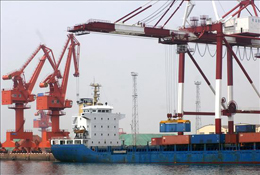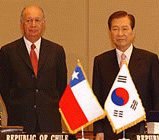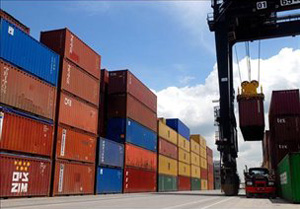Perceptions of the South Korean foreign policy towards Argentina, Brazil and Chile
By Alejandra Chacon Morales *
In the framework of the foreign policies of South Korea, arose the question of analyzing the situation and the importance of this country towards some countries of Latin America.
The administration of president Roh Moo-hyun obtained an historical achievement signing the Free Trade Agreement with Chile with results, in general positives according to both foreign ministries, because of the increment in the bilateral commerce at the first trimester of 2008, which got up to USD 1.969 millions with an increase of 32.1%, being the highest among the principal commercial partners of Chile. Also Korea maintain the fifth position as a commercial partner with Chile, after the US, China, Japan and Brazil (1).
 Bilateral relations with Argentina and Brazil, despite of non existing FTAs among these countries nowadays, it’s marked by a broad relation, that can be traced to the sixties and seventies when a massive Korean immigration was initiated, being approximately 105.000 those who arrived to all of Latin America, half of them in Brazil, country that now has 50.000 Koreans.(Gymaraes, 2006:5)
Bilateral relations with Argentina and Brazil, despite of non existing FTAs among these countries nowadays, it’s marked by a broad relation, that can be traced to the sixties and seventies when a massive Korean immigration was initiated, being approximately 105.000 those who arrived to all of Latin America, half of them in Brazil, country that now has 50.000 Koreans.(Gymaraes, 2006:5)
In the case of Argentina, the first immigration wave arrived in 1965, and then in regular patterns between 1970 and 1978 and during the eighties, when the procedures for Korean immigrants in Argentina Act was signed in 1985. (Mera, 2005: 31-45) This and other common issues make as study and are a source of information on the Korean foreign policy.
The main objective of the research, in which this work was based, was to determine and understand, from the point of view of Latin American scholars of Korea, their own thoughts about foreign policy (in politics, economy and cultural issues) towards Argentina, Brazil and Chile (ABC). The selected time frame was between 2003 and this year, because of the little time available to do the research and in order to have a state of the art map of the developing of this relations as well as the necessity of continuity of this politics, at the eve of a new administration in South Korea.
The Research was made thanks to a wide bibliographical review and the formulation of enquiries to South Korean scholars’ experts in Latin America, which gently answered the questions in terms of confidentiality and anonymity.
South Korean foreign policy towards Argentina, Brazil and Chile
South Korean foreign policy marked a milestone during the sixties when establishing diplomatic relations with the majority of countries from Latin America, like Brazil in 1959 and Argentina and Chile in 1962, among other nations of the region.
During the nineties with the consolidation of South Korea internal politics, it was established a series of principles that, in the opinion of the scholar Kwak Jae Sung included the concepts of globalization, diversification, multi functionality, regional cooperation and a future orientation in foreign policy.(Choe, 2006: 31)
At that time the relations with Latin America were reinforced by the visit in 1996 of Kim Young Sam, the first South Korean President who traveled to the region. Then in 2001 president Cardoso of Brazil went to Korea, and above all, this relations were straighten with the APEC 2004 summit in Chile, were the former president Roh Moo-hyun made a tour in different countries and signed agreements in different issues, as in the case of Argentina, were signed agreements of economic cooperation, education, mining, natural resources, technology, farming, IT, among others. With Brazil the agreements included economical cooperation, energy and IT.
Nevertheless, one huge achievement of the South Korean foreign policy was the FTA with Chile, in 2004, which allowed that bilateral commerce to increase considerably, and also made possible future negotiations of Korea with other countries, including MERCOSUR. Also, Chile signed other agreements with South Korea such as Double taxation exemption agreement, promotion and protection of investments agreement and a nuclear cooperation for pacific purposes agreement, among others.
 South Korean necessity of maintaining good relations with the ABC countries could also be explained in political terms “South Korea is a observer member of the OAS, participates in the reunions of Group of Rio, and is a extra-regional member of the IADB” (Neghme, 2007: 9) and from July 2007 is also member of ECLAC. It’s in this area that, the most important political issue has been the support of Argentina, Brazil and Chile to South Korea, in the pacific solution of the North Korea nuclear program.(Choe, 2006: 34)
South Korean necessity of maintaining good relations with the ABC countries could also be explained in political terms “South Korea is a observer member of the OAS, participates in the reunions of Group of Rio, and is a extra-regional member of the IADB” (Neghme, 2007: 9) and from July 2007 is also member of ECLAC. It’s in this area that, the most important political issue has been the support of Argentina, Brazil and Chile to South Korea, in the pacific solution of the North Korea nuclear program.(Choe, 2006: 34)
The new administration of President Lee Myung-bak has defined a foreign policy strategy that strengthens the relationship with the regional powers and searches new diplomatic relations in the base of natural resources necessities and the maintenance of globalization and market economies concept (2).
Closer ties with Latin America, under these parameters could be explained under this new foreign policy of energy and economic, as well as scientific, technological and cultural cooperation. APEC Peru 2008 left the impression much remains to be done on Asia-Pacific issues due to the international crisis. It also made clear that now, more than ever, APEC’s member economies need to seek out avenues of cooperation.
President Lee Myung-bak made it very clear that cooperation with Latin America would be part of his new foreign policy agenda. In his speech of 22 November 2008 in Lima, the South Korean president stated: "I am confident that we can create unlimited opportunities if Korean and Latin American companies cooperate with each other. Korea and Latin America need to seriously reflect on the creation of a Korea - Latin America cooperation fund and a Korean-Latin American Center. Senior officials from both sides should also have a forum to discuss ways to support our nations’ businesses in the region." At the end of the speech, Lee added, "Geographical distance should not be a hindrance to cooperation." (3)
This statement shows the importance the president wants to give Latin America on his foreign policy agenda. He is actively seeking a substantive cooperation agreement, essential in times of crisis. Despite canceling his scheduled visit to Chile, he had time to talk with President Bachelet regarding the possibility of supporting Korean companies seeking to make inroads into the Chilean market in the power generation and broadband internet sectors. There are several Korean companies that are making this kind of effort. He highlighted the fact that Korean WiBro (wireless broadband) systems would be an excellent Chile, given its mountainous terrain.
The most important meeting, however, was held in Brazil with President Lula, before APEC began. Both leaders pledged to cooperate closely on the creation of a new international financial order and to help the global economy to overcome the current crisis.
 Regarding the participation of Korean companies in Brazil, the high speed railway and shipbuilding sectors were highlighted. They also agreed to support South Korean companies wishing to participate in plans to build eight Brazilian nuclear power plants (by 2030) and 520 kilometers of high speed rail linking Rio de Janeiro, Sao Paulo and Campinas.
Regarding the participation of Korean companies in Brazil, the high speed railway and shipbuilding sectors were highlighted. They also agreed to support South Korean companies wishing to participate in plans to build eight Brazilian nuclear power plants (by 2030) and 520 kilometers of high speed rail linking Rio de Janeiro, Sao Paulo and Campinas.
The presidents signed a Memorandum of Understanding to expand cooperation in the of green technology and bio-ethanol development in Brazil, talks to increase flights to both countries, the establishment of agricultural cooperation and the reciprocal establishment of centers for promotion of trade and industrial cooperation, among other issues. It was also agreed to continue negotiations to further the implementation of free trade negotiations between Korea and MERCOSUR, as well as extending an invitation to the Brazilian president to visit South Korea in 2009.
South Korean foreign policy under the administration of President Roh Moo-hyun was set by the scholar Kwak Jae Sung, concepts such as: globalization, diversification, multi-functionality, regional cooperation and a future orientation in foreign policy.
We can trace in this context, the policies of the new president Lee, who also added the necessity of the search for natural resources and the orientation towards the support of regional powers including the United States.
Latin America and especially the ABC countries are not a strategic priority of the South Korean foreign policy, nevertheless there is a “strategy” of the South Korean government to search for new markets and trade partners. This strategy came after the Asian crisis and has been carefully planned to improve the economic development of South Korea.
With the ABC countries, it has achieved the relation status of “Comprehensive Cooperative Relationship for the Common Prosperity in the 21st. Century”, due to the visit of President Roh Moo-hyun to the three countries, as part of the APEC 2004 summit held in Chile. At that time, a series of agreements were signed and they arranged the commitment for the improvement of the relations between the three countries and South Korea. These agreements were reinforced, principally with Brazil, because of APEC 2008 in Lima, Peru.
In the economic area, according to the questionnaires and the bibliographical revision, South Korea is looking to increase the commerce and the foreign investments with the ABC countries. Also, under the new administration of President Lee there is a necessity of joint ventures in the exploration of natural resources and minerals. The FTA with Chile improved the economic relations with the country and allowed a better understanding of the Chilean market by the South Korean citizens. The eventual FTA with the MERCOSUR, could improve even more the relations with Argentina and Brazil, but despite of some joint studies of feasibility for a FTA, the answers to this question, showed that there is no probability of that event during this presidential period. This could be, due to the current negotiations of South Korea with countries of the Asia-Pacific region, such as China, Japan and also with the European Union.
Priority areas of the South Korean foreign policy are the relations with Brazil, because of their abundance of natural resources and the scientific and technological cooperation as well as the large community of Koreans living in this country. In second place, is the excellent relation with Chile in the commercial area and Argentina is in last place due to the perception of instability at the regional level.
In the political arena, according to the questionnaires and the bibliographical revision, South Korea has no unresolved issues with the ABC countries. These three countries have supported the non proliferation of nuclear weapons, the pacification of the Korean peninsula and helped South Korea to join the IADB and ECLAC. Despite of the bilateral diplomatic relations of Brazil and Chile with North, it doesn´t look like a problem, mainly because of their position in a possible reunification of the Korean peninsula, that in the future can be seen as a continuity of their relations. Argentina held diplomatic relations with North Korea until 1977, but they broke down, trying to prioritize their relation with South Korea.
 In the cultural area, there are numerous initiatives from the Korean side to open spaces of knowledge about the Korean culture, such as agreements, programs and exchanges. Nevertheless according to the questionnaires, there is a necessity for a more extended academic and student exchange, not just visits. Another important area is the promotion of the language study, Spanish and Portuguese in the Koreans case, and Korean by the ABC students. There are many initiatives but also a lack of a deeper knowledge in the cultural, historic and political areas, which can help to understand the diverse realities of the ABC countries. On the other hand, there are agreements in the scientific and technological field. Development in this area is especially vigorous in the military sector, and shows that there is a more complex relation among these countries, than the simplistic economic relations view.
In the cultural area, there are numerous initiatives from the Korean side to open spaces of knowledge about the Korean culture, such as agreements, programs and exchanges. Nevertheless according to the questionnaires, there is a necessity for a more extended academic and student exchange, not just visits. Another important area is the promotion of the language study, Spanish and Portuguese in the Koreans case, and Korean by the ABC students. There are many initiatives but also a lack of a deeper knowledge in the cultural, historic and political areas, which can help to understand the diverse realities of the ABC countries. On the other hand, there are agreements in the scientific and technological field. Development in this area is especially vigorous in the military sector, and shows that there is a more complex relation among these countries, than the simplistic economic relations view.
The basic conclusion of this research is that under the administration of President Roh Moo-hyun and the strategy of President Lee, ABC countries are not a priority of the South Korean foreign policy. But the pragmatism, after the Asian economic crisis, and the necessity of natural resources, has allowed a progressive development of the relations with these countries, as can be seen in the relations of the FTA with Chile, feasibility studies of a possible FTA with the MERCOSUR and improvements of their relations.
Other issues, besides commerce, allow a stronger relation over time, such as scientific, technological and military cooperation, as well as the migration and cultural exchange. This may explain the level of importance from the South Korea point of view of their relations with the ABC countries. The strategy of excellent bilateral relations is consolidated in Latin America and we can predict that they will be even better in the future.
* Alejandra Chacón Morales. Graduated in Law and Political Sciences at University of Panama, Lawyer before the Supreme Court of Panama and Master in International Studies at University of Chile. She has participated as co-researcher in diverse projects.
Footnotes:
1. Source: Boletín de la Cámara de Comercio Coreana. Informativo Chile – Corea, INSOC- 305-2008.
2. See: http://www.tokyofoundation.org/en/articles/a-new-era-in-south-korean-foreign-policy.
3. Source: Korea. Net
Bibliography
- Choe Gyoung-Joo, (2006) “Política Exterior de Corea hacia América Latina. Evolución, desafíos y perspectivas futuras” En: Di Masi Jorge/Crisconio Magdalena, Corea Argentina: percepciones mutuas desde una perspectiva regional, Asociación Argentina de Estudios Coreanos, Segundo Congreso Nacional de Estudios Coreanos, La Plata, Argentina, P.31.
- Gymaraes, Lytton., (2006), The Korean community in Brazil: challenges, achievements and prospects, paper The 3rd World Congress of Korean Studies, Cheju National University, Jejudo, South Korea, Oct 27 -30,. P. 5.
- Mera, Carolina, (2005) “Historia de la Migración hacia la Argentina”, En: Mera Carolina, Consiansi Liliana y González Carmen, Coreanos en Argentina: 10 años de Historia, Ediciones Al Margen, La Plata Argentina, pp. 31-45.
- Neghme, Verónica, (2007), Vinculaciones América Latina-Asia: Presente y Futuro, documento de trabajo, Santiago, Chile, P. 9. Published in: http://asiapacifico.bcn.cl .Consulted on July 15, 2008.




